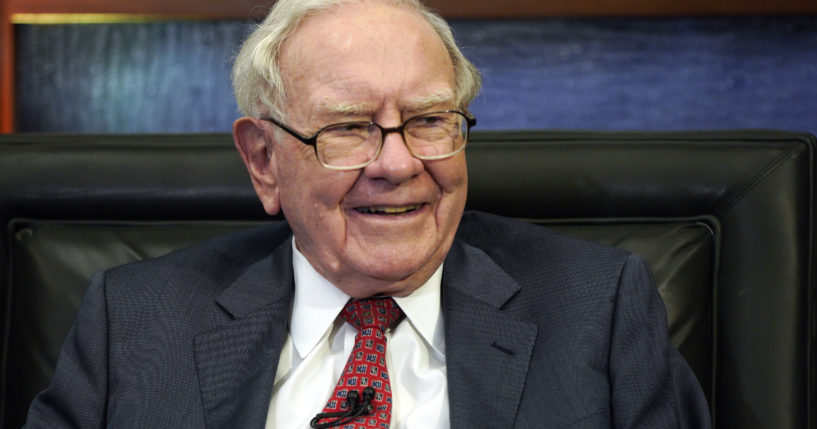
Warren Buffett Announces He's Given $39.3 Billion to Bill Gates' Foundation
After 17 years of steady payments, Berkshire Hathaway CEO Warren Buffett has given annual donations totaling $50.7 billion toward his historic multibillion-dollar pledges to the Bill & Melinda Gates Foundation and to four foundations connected to his family, according to a Chronicle of Philanthropy tally.
Buffett, 92, announced his latest annual payments toward his pledges on Wednesday.
Buffett became the biggest donor in history in June 2006 when he pledged 10 million shares of his Berkshire Hathaway Class B stock — then valued at about $36.1 billion — to the Gates Foundation.
Also that June, Buffett pledged 1 million Berkshire shares, then valued at $3.6 billion, to the foundation named for his late first wife, Susan Thompson Buffett, and 350,00 shares, then valued at about $1.3 billion apiece, to foundations created by his three children — Susan, Howard, and Peter Buffett.
Combined, those five pledges amounted to more than $40 billion at the time. In 2010, Buffett and Berkshire’s other shareholders approved a stock split, which significantly increased the number of shares Buffet has given the five foundations in the years since.
With the latest payments, he has given the Gates Foundation nearly $39.3 billion, the Susan Thompson Buffett Foundation almost $4.2 billion, and more than $2.4 billion apiece to the Sherwood, Howard G. Buffett, and NoVo foundations.
Although he has exceeded his original pledges, a spokeswoman for Buffett told the Chronicle that he will continue to make payments to the five foundations throughout his lifetime, as he promised to do in the statements he made announcing the pledges in 2006.
When Buffett announced his huge pledge to the Gates Foundation, he said he was doing so because he was confident it could make the most money.
“I don’t think I’m as well cut out to be a philanthropist as Bill and Melinda are,” Buffett told Fortune magazine in 2006. “What can be more logical, in whatever you want done, than finding someone better equipped than you are to do it?”
That thinking was greeted with enthusiastic approval by philanthropy experts in 2006 and remains admired today.
Philanthropy historian Benjamin Soskis said Buffett’s decision to give the money to an organization he thought could handle it better than he could was “innovative,” and he wishes others would have followed Buffett’s lead.
“If more wealthy donors had embraced that, it really could have had a huge impact on the sector because it would have concentrated funding in smaller and smaller fiefdoms,” Soskis said. “It was a really interesting idea, but not one that has been widely taken up.”
Buffett’s example remains powerful nearly two decades later, according to Phil Buchanan, who leads the Center for Effective Philanthropy, because it showed rich donors that having tens of billions of dollars does not mean they have to pursue their philanthropic goals by creating a new foundation that will exist long after they are gone.
“He showed folks that there are existing institutions that you can look to, whether foundations, in his case, or any number of different giving vehicles or to nonprofits themselves,” Buchanan said. “I think that’s really healthy and positive.”
Buffett structured his Gates Foundation pledge so it would receive 5% of the promised shares each year starting in 2006. He stipulated that either Bill Gates or Melinda French Gates “must remain alive and active in the policy-setting and administration of the foundation” to continue receiving the annual disbursements.
He also said the Gates Foundation must spend the value of the previous year’s gift plus 5% of its net assets each year and that spending excesses could be carried forward and shortfalls made up the following year.
Buffett joined the Gates Foundation board and has made gifts toward his commitment every summer since he announced the pledge.
Philanthropy experts say that by making the Gates Foundation one of the wealthiest grant-makers in the world, Buffett’s pledge triggered a shifting of power within the foundation world: The Gates Foundation rose to the top of the heap, and some legacy grant-makers saw their power dim. It also placed the Gates Foundation under a microscope of public scrutiny.
“Buffett turned a large foundation into a colossus and into something that was an order of magnitude much larger than its peers,” Soskis said. “The amount of pressure that put on the institution to spend amounts of money that no foundation had ever spent before on a consistent basis as a normal form of operation required a real transformation of the foundation and a scaling of its bureaucracy and of its ambition.
“And so it turned what was already an incredibly large foundation into what it’s become now, which is, both for critics and for champions, the embodiment of large-scale philanthropic funding.”
Buffett stepped down from the Gates Foundation’s board in the spring of 2021 shortly after the Gateses announced they were divorcing. He did not address the divorce in a statement announcing his resignation but said the decision to leave the grant-maker’s board followed his stepping away from all of the corporate boards he had been serving on except Berkshire Hathaway.
The Western Journal has reviewed this Associated Press story and may have altered it prior to publication to ensure that it meets our editorial standards.
Truth and Accuracy
We are committed to truth and accuracy in all of our journalism. Read our editorial standards.
Advertise with The Western Journal and reach millions of highly engaged readers, while supporting our work. Advertise Today.










